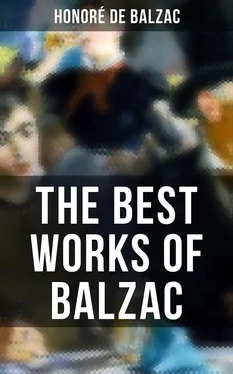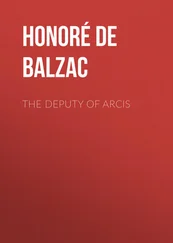Before leaving Fougeres the chief secretly issued to his own men ample supplies of ammunition and sufficient rations of bread for the whole detachment, so as to conceal from the conscripts the length of the march before them. He intended not to stop at Ernee (the last stage before Mayenne), where the men of the contingent might find a way of communicating with the Chouans who were no doubt hanging on his flanks. The dead silence which reigned among the recruits, surprised at the manoeuvring of the old republican, and their lagging march up the mountain excited to the very utmost the distrust and watchfulness of the chief—whose name was Hulot. All the striking points in the foregoing description had been to him matters of the keenest interest; he marched in silence, surrounded by five young officers, each of whom respected the evident preoccupation of their leader. But just as Hulot reached the summit of La Pelerine he turned his head, as if by instinct, to inspect the anxious faces of the recruits, and suddenly broke silence. The slow advance of the Bretons had put a distance of three or four hundred feet between themselves and their escort. Hulot’s face contorted after a fashion peculiar to himself.
“What the devil are those dandies up to?” he exclaimed in a sonorous voice. “Creeping instead of marching, I call it.”
At his first words the officers who accompanied him turned spasmodically, as if startled out of sleep by a sudden noise. The sergeants and corporals followed their example, and the whole company paused in its march without receiving the wished for “Halt!” Though the officers cast a first look at the detachment, which was creeping like an elongated tortoise up the mountain of La Pelerine, these young men, all dragged, like many others, from important studies to defend their country, and in whom war had not yet smothered the sentiment of art, were so much struck by the scene which lay spread before their eyes that they made no answer to their chief’s remark, the real significance of which was unknown to them. Though they had come from Fougeres, where the scene which now presented itself to their eyes is also visible (but with certain differences caused by the change of perspective), they could not resist pausing to admire it again, like those dilettanti who enjoy all music the more when familiar with its construction.
From the summit of La Pelerine the traveller’s eye can range over the great valley of Couesnon, at one of the farthest points of which, along the horizon, lay the town of Fougeres. From here the officers could see, to its full extent, the basin of this intervale, as remarkable for the fertility of its soil as for the variety of its aspects. Mountains of gneiss and slate rose on all sides, like an ampitheatre, hiding their ruddy flanks behind forests of oak, and forming on their declivities other and lesser valleys full of dewy freshness. These rocky heights made a vast enclosure, circular in form, in the centre of which a meadow lay softly stretched, like the lawn of an English garden. A number of evergreen hedges, defining irregular pieces of property which were planted with trees, gave to this carpet of verdure a character of its own, and one that is somewhat unusual among the landscapes of France; it held the teeming secrets of many beauties in its various contrasts, the effects of which were fine enough to arrest the eye of the most indifferent spectator.
At this particular moment the scene was brightened by the fleeting glow with which Nature delights at times in heightening the beauty of her imperishable creations. While the detachment was crossing the valley, the rising sun had slowly scattered the fleecy mists which float above the meadows of a September morning. As the soldiers turned to look back, an invisible hand seemed to lift from the landscape the last of these veils—a delicate vapor, like a diaphanous gauze through which the glow of precious jewels excites our curiosity. Not a cloud could be seen on the wide horizon to mark by its silvery whiteness that the vast blue arch was the firmament; it seemed, on the contrary, a dais of silk, held up by the summits of the mountains and placed in the atmosphere, to protect that beautiful assemblage of fields and meadows and groves and brooks.
The group of young officers paused to examine a scene so filled with natural beauties. The eyes of some roved among the copses, which the sterner tints of autumn were already enriching with their russet tones, contrasting the more with the emerald-green of the meadows in which they grew; others took note of a different contrast, made by the ruddy fields, where the buckwheat had been cut and tied in sheaves (like stands of arms around a bivouac), adjoining other fields of rich ploughed land, from which the rye was already harvested. Here and there were dark slate roofs above which puffs of white smoke were rising. The glittering silver threads of the winding brooks caught the eye, here and there, by one of those optic lures which render the soul—one knows not how or why—perplexed and dreamy. The fragrant freshness of the autumn breeze, the stronger odors of the forest, rose like a waft of incense to the admirers of this beautiful region, who noticed with delight its rare wild-flowers, its vigorous vegetation, and its verdure, worthy of England, the very word being common to the two languages. A few cattle gave life to the scene, already so dramatic. The birds sang, filling the valley with a sweet, vague melody that quivered in the air. If a quiet imagination will picture to itself these rich fluctuations of light and shade, the vaporous outline of the mountains, the mysterious perspectives which were seen where the trees gave an opening, or the streamlets ran, or some coquettish little glade fled away in the distance; if memory will color, as it were, this sketch, as fleeting as the moment when it was taken, the persons for whom such pictures are not without charm will have an imperfect image of the magic scene which delighted the still impressionable souls of the young officers.
Thinking that the poor recruits must be leaving, with regret, their own country and their beloved customs, to die, perhaps, in foreign lands, they involuntarily excused a tardiness their feelings comprehended. Then, with the generosity natural to soldiers, they disguised their indulgence under an apparent desire to examine into the military position of the land. But Hulot, whom we shall henceforth call the commandant, to avoid giving him the inharmonious title of “chief of a half-brigade” was one of those soldiers who, in critical moments, cannot be caught by the charms of a landscape, were they even those of a terrestrial paradise. He shook his head with an impatient gesture and contracted the thick, black eyebrows which gave so stern an expression to his face.
“Why the devil don’t they come up?” he said, for the second time, in a hoarse voice, roughened by the toils of war.
“You ask why?” replied a voice.
Hearing these words, which seemed to issue from a horn, such as the peasants of the western valleys use to call their flocks, the commandant turned sharply round, as if pricked by a sword, and beheld, close behind him, a personage even more fantastic in appearance than any of those who were now being escorted to Mayenne to serve the Republic. This unknown man, short and thick-set in figure and broad-shouldered, had a head like a bull, to which, in fact, he bore more than one resemblance. His nose seemed shorter than it was, on account of the thick nostrils. His full lips, drawn from the teeth which were white as snow, his large and round black eyes with their shaggy brows, his hanging ears and tawny hair,—seemed to belong far less to our fine Caucasian race than to a breed of herbivorous animals. The total absence of all the usual characteristics of the social man made that bare head still more remarkable. The face, bronzed by the sun (its angular outlines presenting a sort of vague likeness to the granite which forms the soil of the region), was the only visible portion of the body of this singular being. From the neck down he was wrapped in a “sarrau” or smock, a sort of russet linen blouse, coarser in texture than that of the trousers of the less fortunate conscripts. This “sarrau,” in which an antiquary would have recognized the “saye,” or the “sayon” of the Gauls, ended at his middle, where it was fastened to two leggings of goatskin by slivers, or thongs of wood, roughly cut,—some of them still covered with their peel or bark. These hides of the nanny-goat (to give them the name by which they were known to the peasantry) covered his legs and thighs, and masked all appearance of human shape. Enormous sabots hid his feet. His long and shining hair fell straight, like the goat’s hair, on either side of his face, being parted in the centre like the hair of certain statues of the Middle-Ages which are still to be seen in our cathedrals. In place of the knotty stick which the conscripts carried over their shoulders, this man held against his breast as though it were a musket, a heavy whip, the lash of which was closely braided and seemed to be twice as long as that of an ordinary whip. The sudden apparition of this strange being seemed easily explained. At first sight some of the officers took him for a recruit or conscript (the words were used indiscriminately) who had outstripped the column. But the commandant himself was singularly surprised by the man’s presence; he showed no alarm, but his face grew thoughtful. After looking the intruder well over, he repeated, mechanically, as if preoccupied with anxious thought: “Yes, why don’t they come on? do you know, you?”
Читать дальше












